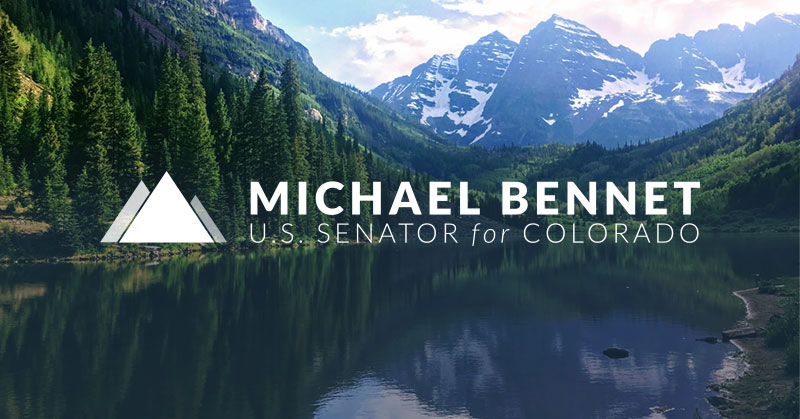Source: United States Senator for Colorado Michael Bennet
Washington, D.C. — Today, Colorado U.S. Senators Michael Bennet, Chair of the Senate Agriculture Subcommittee on Conservation, Climate, Forestry, and Natural Resources, and U.S. Senator Roger Marshall (R-Kan.), the subcommittee’s Ranking Member, introduced the Conservation Reserve Enhancement Program (CREP) Improvement Act to provide the flexibility family farmers and ranchers need to conserve water on working lands, while fairly compensating them for retiring their water rights or limiting their water use.
“Colorado’s family farmers and ranchers face a 1,200 year drought, a changing climate, and a future that’s going to be a lot hotter and a lot drier. They don’t have any time to waste and they need us to make USDA’s conservation programs work to live up to their potential. With the CREP Improvement Act, we can give farmers the flexibility they need to conserve their water supply and pass their operations onto their kids and grandkids,” said Bennet.
“As Ranking Member of the Subcommittee on Conservation, Climate, Forestry, and Natural Resources, I’m proud to partner with Chairman Senator Bennet on this legislative solution to the water crisis we are facing in the west. Time and time again, we hear USDA is being too rigid in their interpretation of good programs, and this bill will help provide the flexibility farmers and ranchers need to preserve our water supply for generations to come,” said Marshall.
The U.S. Department of Agriculture’s (USDA) CREP program has provided farmers and ranchers with payments to voluntarily remove land from production in order to address specific conservation concerns. However, producers within the CREP program have sought more flexibility to achieve the program’s goals. While the 2018 Farm Bill included a provision to allow dryland farming on retired irrigated acres in CREP, USDA still has not implemented this provision fully, and payments on dryland farmed acres are insufficient to encourage participation in key regions where water conservation is a top concern.
Specifically, the Conservation Reserve Enhancement Program Improvement Act would improve the CREP program by:
-
Explicitly directing USDA to allow dryland agricultural uses on CREP acreage where appropriate;
-
Specifically adding dryland crop production and grazing to the list of appropriate conservation practices for the CREP program;
-
Allowing continuous cropping systems, like alfalfa, to be eligible for drought and water conservation CREP agreements;
-
Ensuring fairer payments to producers by stipulating that annual payments for drought and water conservation CREP agreements will be equal to the difference between the irrigated acre payment rates and the dryland acre payment rates, as determined by USDA. And ensuring that any drought and water conservation agreement that includes the permanent retirement of a water right receives the full irrigated acre payment rate;
-
Making the payment formula retroactive for existing drought and water conservation agreements;
-
Letting producers choose their payment allocations under the program, instead of a fixed payment per year for the 10-15 year contract period; and
-
Waiving CREP payments from the $50,000 annual payment limitation under the Conservation Reserve Program.
“It is very encouraging to see Senator Bennet’s efforts in the Farm Bill to improve certain provisions of the dryland farmable Conservation Reserve Enhancement Program. The improved program will aid in water conservation efforts, will help keep young people in agriculture, and will serve to strengthen our rural communities,” said Don Brown, Board Director, Republican River Water Conservation District and former Colorado Commissioner of Agriculture
“The Rio Grande CREP has been a critical tool in supporting farmers in the San Luis Valley for over a decade as they voluntarily reduce groundwater pumping. These proposed changes will help bring additional farmers into the program and provide additional certainty for farmers facing an uncertain water future. We appreciate Senator Bennet’s long-time support of this program,” said Amber Pacheco, Deputy Manager, Rio Grande Water Conservation District.
The text of the bill is available HERE. A summary is available HERE.
